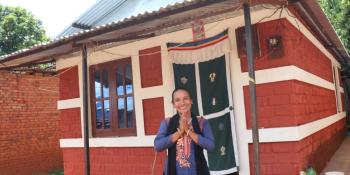As the COVID-19 crisis becomes drawn out, decades of progress are being reversed, pushing millions of people including children deeper into poverty, according to the United Nations and World Bank. In a time of pandemic, a safe and healthy home is the first line of defense against COVID-19 transmission.
“Housing conditions can literally mean the difference between life and death,” said Jonathan Reckford, CEO of Habitat for Humanity International. “In any disaster, it is those with the least who are impacted the most. These are the families with whom Habitat partners. Now, more than ever, we need to make sure we are ready and able to answer the call.”
Since the coronavirus outbreak, the Habitat network in the Asia-Pacific region has responded to various needs including providing temporary shelter to beleaguered healthcare workers in Indonesia and distributing hygiene kits to help vulnerable groups in India reduce the risk of COVID-19 transmission.
Habitat will also support families facing economic hardships due to the corona virus through improving housing affordability, housing-related employment generation and helping housing markets in crisis to recover.
In the new COVID-19 reality, housing plays a key role in driving economic recovery globally. Habitat backs entrepreneurs with innovative housing approaches and technologies adapted for the pandemic and seeks to strengthen local construction labor market. We also facilitate the rehabilitation of market supply chains, enabling families to build safer, healthier homes as well as spur economic activity in local communities, among others.
Habitat homeowners shared that they felt safe and secure despite the pandemic. Children are able to study and play in ample space and parents can continue to make a living from home.
Now more than ever we need you.
Help families stay safe and healthy in secure homes.








